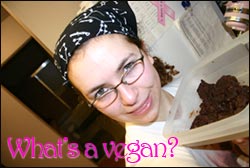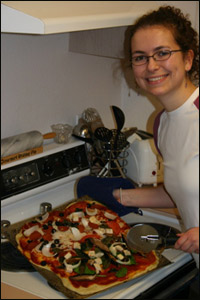I’m excited for the upcoming Carnival of Empty Cages. I hope the carnival will help me find and join the vegan blog scene now that Tekanji has provided me a place to discuss my herbivorism. I begin by defining vegan because it’s a fluid term. I intend this post to be a gateway to future discussions about my veganism coinciding with my feminism (and how I got here), the intersections of animal exploitation and human oppression, and even some critiques of the animal rights movement from an anti-racist feminist perspective.
Motives for Writing

Last quarter, in my feminist theory class at university, I focused on the intersection of animal liberation and feminism for my term paper. As I expected, the authors I consulted argued that veganism coincides with a feminist lifestyle (I’ll talk more about this connection in future posts). But some of the authors assumed I already knew what veganism was; a definition of vegan was missing. How did they hope to persuade the feminist who pictured an anemic, maligned salad-eater?
So what is it already?
Vegan is a fluid identity. I want to lay out what it means to me because not everyone shares my definition and I want readers to know what I’m talking about when I say vegan. Fellow veg*ns are free to disagree, so long as they don’t tell me I’m not vegan–I still have a few outstanding warrants from the Vegan Police to dodge first. (Veg*n is a catch all term for people on the spectrum of vegetarianism.)
My definition:
A vegan is someone who boycotts direct support of animal cruelty. This primarily comes into practice with my choices as a consumer. I ask myself: is my money going towards animal suffering? If we’re talking about the eggs in a pastry, yes. I’m supporting an industry that even in cage-free settings must slaughter male chicks and the hens past their reproductive prime because keeping them alive would be too expensive.
I don’t avoid items far removed from animal harvesting. For example, how would I be helping animals by not purchasing a bike produced with glue containing animal ingredients? Those byproducts of animal slaughter will be replaced by plant-derived sources, which will become cheaper when less animals are slaughtered for meat. Veganism is lifestyle that incorporates a boycott of direct forms of cruelty.
Although I don’t purchase leather or wool items, and avoid products tested on animals, my veganism in practice primarily focuses on what I eat. Because 99 out of 100 animals raised in my country are slaughtered for food, I believe my efforts will have most of an impact focusing on the consumption of animal products. I don’t eat meat, diary, or eggs because harvesting these foods requires animal suffering. I do make other food considerations that don’t fall under veganism. For example, I prefer local produce to support sustainable agriculture and avoid partially hydrogenated oils for my health.
If a food item is labeled vegan, it doesn’t contain meat, gelatin, dairy, eggs, or honey. When I say meat, I include poultry and seafood.
Veg-in? Vay-gun? Veegan?
I pronounce it vee-gan. I haven’t heard a vegan pronounce it otherwise, so be prepared for some funny looks if you call us veggin’s or vay-guns (rhymes with ray-gun).
Animal Rights and Animal Welfare
I want to clarify the difference between animal rights and animal welfare. Animal welfare is what most of you (and me) are in favor of: humane treatment of animals. Animal rights advocates entire liberation from human use. We both don’t want animals to suffer unnecessarily, but we don’t agree on what’s necessary.
I compare animal welfare and animal rights to liberal feminism and radical feminism. Animal welfare and liberal feminism both work for change within the system, while animal rights and radical feminism want a revolution that will dismantle oppressive hierarchies. (Ecofeminism joins the two and recognizes the ways in which animal and human dominion are interconnected.) I prefer to focus on our common goals rather than our differences. Fighting amongst ourselves takes time away from changing the world.
Options

Veganism isn’t an exclusive club, nor does it have to be all or nothing. I encourage people to do what they can in their own lives. If you want to be vegan but would never give up cheese pizza or Turkey on Thanksgiving (and the faux stuff doesn’t do it for you), that doesn’t mean you can’t boycott other forms of animal cruelty from your life.
My veganism is largely inspired by the group Vegan Outreach (I recommend their website if you want to read up more about reasons for being vegan and what it entails, or there is always the Wikipedia article). They taught me that veganism is not about avoiding a list of ingredients. What fun is that? I’m the last person who wants her options limited. I remind myself that this is a choice (although I seldom remember these days that animal derived foods are an option). This is who I am, who I always will be, and I have fun with it.
